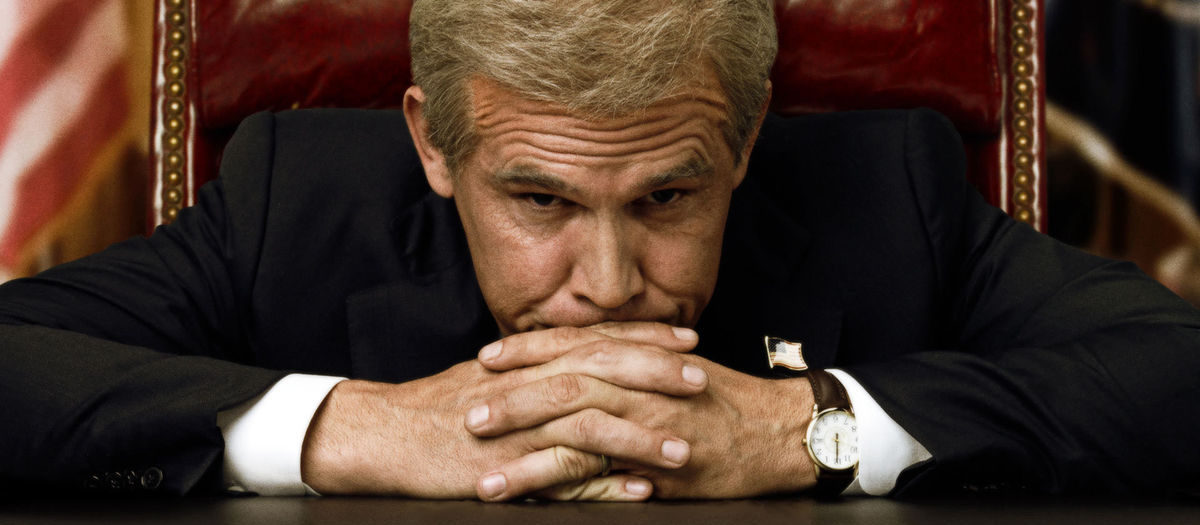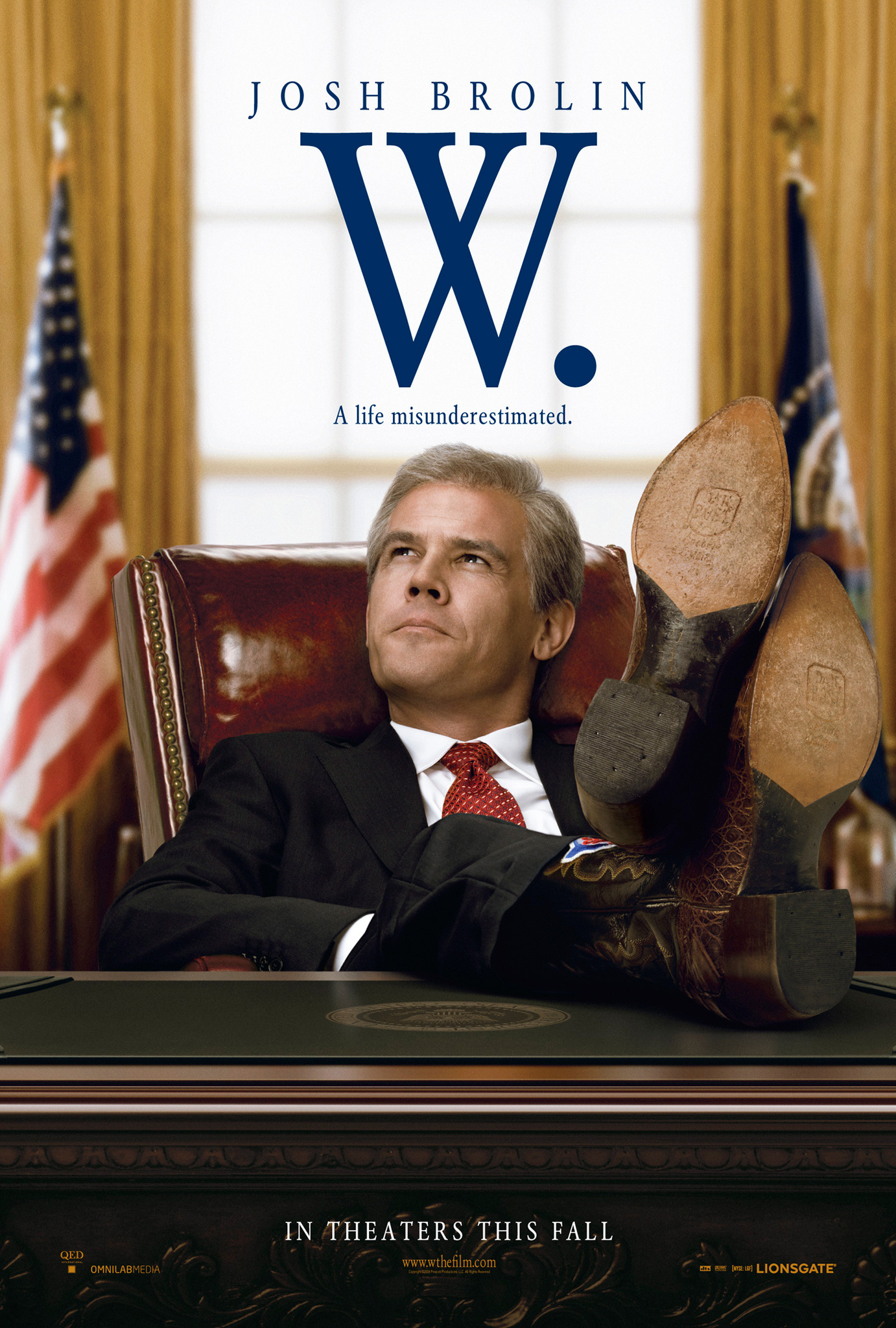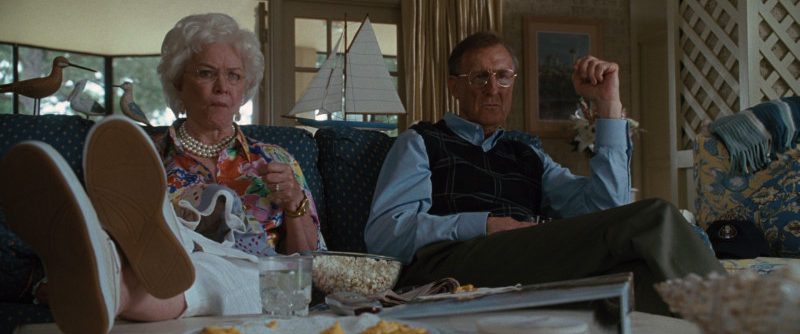

“What are you cut out for? Partying, chasing tail, driving drunk? Who do you think you are, a Kennedy? You’re a Bush! Act like one. Can’t even hold a job. We always worked for a living. It’s time you joined the rest of us and decided just what it is you’re gonna do with your life.”
W. appears to have an identity crisis. It tries to throw light jabs at the 43rd President of the United States, but also to sympathetically explain away his myriad flaws by tracing them back to the father-son head butting contests of his youth. By zeroing in on the daddy issues—sidestepping obvious watershed events in the process, but also pandering to the pop news junkies with random inclusions of meaningless tidbits from the years of the Bush administration—Oliver Stone finds himself in no man’s land.
The real disappointment here is that Stone has made a film without teeth, a work that is superficial and vague, so inert that even if it leaned more clearly to one side of the political aisle or the other, no one would care. And yet this was a film that chronicled the silver-spooned adolescence of the then-sitting President! How could it be so lifeless, so uncertain if it wants to mock or evoke empathy, so uneven with its jocular tone and lopsided dramatics, so uncontroversial and unremarkable? There have been plenty of great movies that focus on American politics—Stone himself may be responsible for more of them than any other single filmmaker—and yet with W. he seems oddly noncommittal. Does he have nothing to say (unlikely) or was his film crafted to avoid controversy about an ongoing war and a sitting president? If the latter, why was it made at all? Is the President simply a deficient protagonist in his own life story? After you’ve seen W., there’s very little chance that you’ll absorb any message—which is fine if we’re talking about an apolitical film, but this thing is weak even as propaganda. It might have at least been entertaining.
Stone and screenwriter Stanley Weiser take the pop psychology route when it comes to analyzing their subject, George W. Bush AKA Dubya (Josh Brolin). All of his ambitions stem from the fact that his father’s love and respect have eluded him and been directed toward baby brother Jeb (Jason Ritter). Very little is on tap as far as explaining his tactical decisions as President, but we are relentlessly bludgeoned over the head with the deep-seated issues between him and Poppy (James Cromwell), as if that is the entirety of Dubya’s personality.
Jumping around from his years at Yale, to his brief tenure in the Texas oil fields, to Harvard, to meeting his wife (Elizabeth Banks), to running for Congress, to making a profession of Christian faith, to working in pro baseball, to becoming Governor of Texas, to ascending to the Presidency, to invading Iraq, W. conveys the true events of Bush Jr.’s life but does so without any gusto. The main focus is on his days as Commander in Chief, surrounded by people like Dick Cheney (Richard Dreyfuss), Colin Powell (Jeffrey Wright), Donald Rumsfield (Scott Glenn), and Condoleezza Rice (Thandie Newton) as he seeks reasons to invade Iraq to reverse what he perceives as his father’s failure to end the Gulf War without deposing Saddam Hussein.

Even if it’s entirely factually accurate (I won’t be bothered to check), it’s decidedly limp in its presentation and doesn’t even stick to its weak unifying theme. To wit, what does Dubya choking on a pretzel have to do with anything? Such an episode could only have been included to poke fun, to paint a broader picture of the President as a clumsy oaf. And yet, Stone steers clear of such a comedic caricature almost entirely.
But come on. If we’re not doing conspiracies or trying to create a complete portrait of the man, let’s at least have some fun. I mean, this was the era when Stewart and Colbert were in their heyday. There’s certainly enough material for a broad satire, and it appears Stone even filmed several absurdist dream sequences along those lines that were ultimately cut. I understand the need to get rid of scenes that don’t fit the tone of a film, but the tone of the film is bland, the caricature of Dubya merely a benign political cartoon. It’s as if the screenwriter thought that merely refraining from straight up calling the man an idiot would be seen as equitable treatment, and so he throws a gazillion soft blows instead. Perhaps the most heinous misstep is the disconnected backstory which sees Dubya transform from a sloshed undergrad to a whip smart campaign manager who intuits the need to exploit Christianity, back to bumbling dingus once elected to the Presidency himself.
W. is a misguided concoction of made-up conversations interspersed with cameo-like appearances of publicly documented episodes from Bush Jr.’s life; a mostly harmless run-through of some of the the 43rd President’s formative moments that never lands a hard punch or develops into a coherent political statement. A 40 year old Oliver Stone, not rushing to release a film in time for a Presidential election, may have crafted a provocative picture about George W. Bush. But the skin-deep W. does not for a moment sniff the rarified air of JFK or Nixon, aesthetic achievements that evoked strong senses of myth, legacy, and loyalty. Instead, it’s a mundane, narrow-scoped letdown.